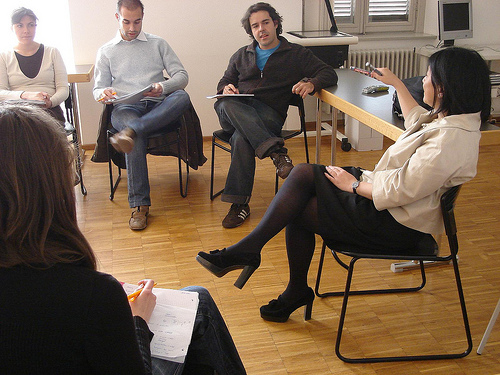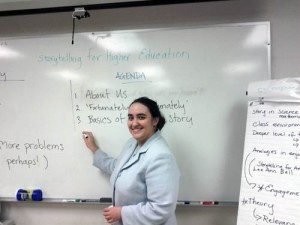Today’s guest post is from Emily D’Alimonte, a full-time Social Work and Women’s Studies major at the University of Windsor. Emily has facilitated both online and face-to-face discussions.
Emily will be co-facilitating a workshop with Christine Rossi next week, February 7, 2012 at 10 am. For more information or to register for “Dynamic Discussions,” please visit the CTL registration page: http://cleo.uwindsor.ca/workshops/ctl/52/.
The first time I had the opportunity to facilitate a discussion occurred within the summer semester of 2011. I had been appointed a Teaching Assistant position for Gal Pals, an immensely popular Women’s Studies course, and I was excited for the new role I was about to take on. I soon found myself in charge of facilitating a fair amount of students within online discussion group forums. Although I was a bit tentative about facilitation, I was astounded by the amount of participation I received from the students! Everyone appeared to be comfortable with the discussion process, and my role as a facilitator was typically rather easy.
 In the fall of 2011, I was appointed the same Teaching Assistant position for Gal Pals, but this section would be taught in class. Once again, I was asked to facilitate discussion groups. Based on my previous experience, I had expected students to be extremely comfortable with the discussion process and I was prepared for ample participation. Therefore, you can imagine how mortified I was as I stood in front of a classroom full of nothing but silence, and blank faces staring back at me. It seemed as though students were not nearly as comfortable with participation as I had once thought! I quickly realized that students were far more likely to participate behind the safety of a computer screen rather than in front of their peers within a classroom. This is why learning tips and tricks about how to facilitate a meaningful discussion (whether in-class or online) is very important for instructors at any level of teaching. Not only will it enable students to have the opportunity to learn within a different type of environment, but it will also aid in the prevention of experiences such as the one I have described above – which is something I feel most instructors would rather avoid!
In the fall of 2011, I was appointed the same Teaching Assistant position for Gal Pals, but this section would be taught in class. Once again, I was asked to facilitate discussion groups. Based on my previous experience, I had expected students to be extremely comfortable with the discussion process and I was prepared for ample participation. Therefore, you can imagine how mortified I was as I stood in front of a classroom full of nothing but silence, and blank faces staring back at me. It seemed as though students were not nearly as comfortable with participation as I had once thought! I quickly realized that students were far more likely to participate behind the safety of a computer screen rather than in front of their peers within a classroom. This is why learning tips and tricks about how to facilitate a meaningful discussion (whether in-class or online) is very important for instructors at any level of teaching. Not only will it enable students to have the opportunity to learn within a different type of environment, but it will also aid in the prevention of experiences such as the one I have described above – which is something I feel most instructors would rather avoid!
(Image: “Susan leads group discussion, a Creative Commons Attribution – Non-commercial image from smannion’s photostream.)
Today’s guest post is from Sonia Sulaiman, who recently facilitated a workshop on storytelling, “To Instruct and Delight”: Storytelling for Higher Education for the GATA Network. Sonia is a professional artist, storyteller, and MA candidate in the department of English Language and Literature at the University of Windsor. For information about this and other GATA Network workshops, please visit the Centre for Teaching and Learning’s registration page.
Last week, in a land far far…
 Well, no, it was right on the University campus, actually, where I had the pleasure of leading a very special workshop for the GA/TA Network at the Centre for Teaching and Learning. Lecture, in some form, is still the predominant instructional strategy for many courses at the post secondary level. Last summer, while attending CTL’s half-credit course on lecturing with Pierre Boulos and Michael Potter, I was introduced to storytelling for teaching in higher education.
Well, no, it was right on the University campus, actually, where I had the pleasure of leading a very special workshop for the GA/TA Network at the Centre for Teaching and Learning. Lecture, in some form, is still the predominant instructional strategy for many courses at the post secondary level. Last summer, while attending CTL’s half-credit course on lecturing with Pierre Boulos and Michael Potter, I was introduced to storytelling for teaching in higher education.
Once people get talking, once the silence is broken, stories are inevitable. The workshop looked at storytelling as a vehicle of communication, although that is just the beginning of the potential for this alternative to lecture. Storytelling can transform classes into communities, engage learners (instructors included), and revitalise content. There is no single method or technique, but an acknowledgment that the story is interactive. The hearers are active participants when storytelling is at its best.
If you are a graduate student I would like to welcome and encourage you to get in touch with CTL, explore an idea and lead your own workshop. Your experiences are valuable, and you have stories to share.
In January 2012, the GATA Network will be holding two workshops for graduate and undergraduate teaching assistants. On Tuesday, January 10 at 9:30 AM, Jessie Beatty will facilitate “The First Day” to help get your new semester off to a great start. Whether this is your first time or fifth time as a teaching assistant, you will learn strategies to engage students in the classroom, studio, and lab.
Then on Tuesday January 16 at 1:45 PM, Sonia Sulaiman will lead “To Instruct and Delight: Storytelling for Higher Education.” Storytelling builds a community of learners and creatively engages people across disciplines. This interactive workshop will give you practice in techniques for using storytelling as an intentional teaching method.
There are no prerequisites for either workshop and registration is limited. To sign up please visit http://cleo.uwindsor.ca/workshops/ctl/52/



Recent Comments